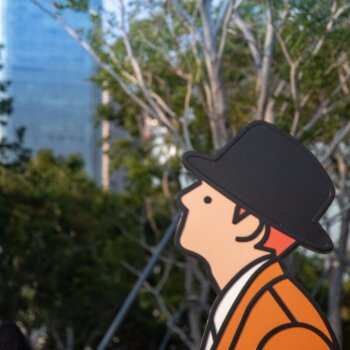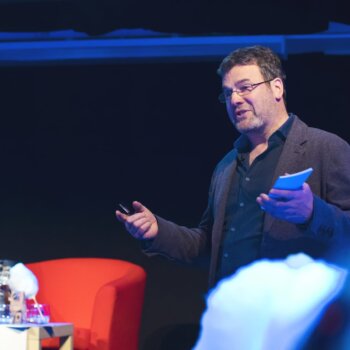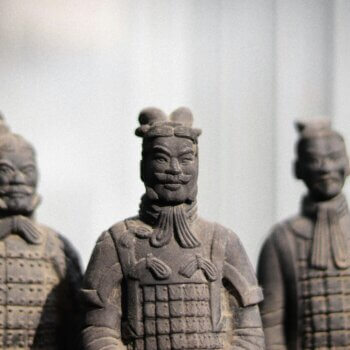Hailing from a corporate background and having served at various HR operations for several years, Saurabh Gupta identifies himself as a social entrepreneur. In the midst of his jobs, Saurabh took sabbaticals to pursue a few youth based social projects and these opportunities introduced him to a lot of intriguing people and gave him a chance to travel to a lot of places round the globe.
After working several years in corporate world, Saurabh finally quit his job, where he found innovative and inspiring ways of catalyzing changes.
Saurabh’s real passion is to work for the betterment of our Earth. During the process of cycling to and fro for work, he spoke to thousands of people about outer and inner sustainability. He tried to develop an understanding in everyone about leading a sustainable life based on personal choices that one can make by slight and important changes in the lifestyle. Fortunately, Saurabh also had the opportunity to conduct a few talks in the corporate sector on the topic, ‘Organic life’ which included- Not using automobile on work commute, Eating like animals- eating for the need and not for the want and Tech Detox- against material excess culture.
In the past, he was blessed with the appreciation and appraisal from His Holiness The Dalai Lama for his work related with youth community on Project ‘Ganga to Nile’.
In your own words what is Earth5R?
Earth5R is a social movement about giving back to Mother Earth and serving the society in a way to culminate in the building of sustainable communities. It is a conglomeration of science, advocacy, education and action to bring about the much needed changes for the planet, through an environmental leadership. We believe in taking shared action via an environmental talk show known as ‘EarthTalk’, a sustainability based online magazine named ‘EarthJournal’ and a community project called ‘I’M EARTH’. As an organization we have an entrepreneurial team of hard-working volunteers who are passionate about building a great change with social and environmental impact.
How did you come up with the idea of Earth5R?
I have grown up in the Himalayas, where we grew the food we ate. We survived in an interdependent and balanced ecosystem, where we even shared our garden produce with the neighbors next door. With a sense of respect for nature, the whole social system was very cohesive. However, moving to the cities presented a whole new picture of reality, where the exploitation of nature grew with the globalization and developmental index of the city. Witnessing the loss of respect and care for nature, there was a growing concern in me to change the prevailing scenarios and I always kept pondering over the ‘how’ of it. The corporate work environment too breathed lack of sustainability- sitting on chairs throughout the day, eyes embedded on computers, eating food while working, drinking cups after cups of coffee and breathing the re-circulated exhaled air. With time and this schedule, I faced a lot of health challenges, starting with getting overweight and then back pain, occasional migraine attacks and gastritis. This was when I came across a cycling marathon and I decided to take it up. Even though I participated in the short distance amateur category, the benefits of cycling lasted for several days. Ever since, I was hooked to cycling and started bicycling everywhere. In the beginning, my passion for cycling was taken as joke as people thought I was unwise enough to cycle on the roads of Mumbai, taken the weather and traffic, to add on. However, with time, people were convinced with my hobby.
In due course of time I lost a lot of weight, became much healthy and started enjoying life a lot more. By this time I was getting in the inner circle of life and started exploring the real meaning of life.
It’s said Buddha achieved Nirvana under a Banyan tree and I joked with my pals claiming, I achieved mine on a bicycle seat. Deciding to break the monotony of work at the corporate sector, I decided to head towards helping people with the aim of sustainability.
After quitting my job, I wanted to travel for some time and to sustain the flow of income, I became self-employed as a natural therapist, and this is when I travelled and bicycled in several countries, crossing latitudes and longitudes.
With a distance greater than the circumference of Earth (40, 008 km), I completed to cover a distance of 50,000 km in 2014 in two years commuting to my workplace and it was then, the idea of Earth5R struck me. With the zeal to start with some ‘work for good’ I believe change is propelled through the power of communities. And to fulfill this, Earth5R started to take shape from last November.
Could you walk us through the process of starting up Earth5R?
After the idea of Earth5R came to me, I developed a very basic website and hired two paid interns to market this idea. However with their sole monetary interest and a meager willingness to contribute to the cause, I saw bleak chances of the success to the desired movement. However, a few people applied to work with us and after having explained to them the volunteer based model that we were to follow at Earth5R, that meant no pay for work as well as a determined will to work, we had our first set of volunteers. The team grew with word of mouth. Hard work along with fun at work brought a lot of meaningful work in practice and consequently helped expand our team. Initially we had the EarthTalk, which is somewhat like a TED Talk, but of and about environment. EarthTalk received a tremendously heartwarming response and to create a large scale impact, we thought of introducing the EarthJournal, to reach out to the masses. The journal is a provocative Scientific-Socio-Economic reportage through an environmental lens. We created this magazine for lovers of Earth, equality, and investigative journalism. EarthJournal too, was welcomed with a very good response. After talking and writing had hit the success bar, it was time to walk the talk and then was born- I’m Earth. In this initiative, comprising of a 120 people team, spread across most of the large cities of India, Germany, Switzerland and France, the team reaches out to the community and nature. Importantly, it builds impact by engaging people in activities that build collaborative change.
Did you encounter any particular difficulties during startup and if so, how did you guys overcome it?
The biggest challenge of any organization being manpower cost was taken care of, by the volunteer run model at Earth5R.
A major challenge that all social projects face is that people join in with a good intention of contributing towards a noble cause, but refuse to leave their comfort zones. Doing things because they are easy or convenient, is not something that we support or encourage as a team or as an individual effort. To overcome this, a uniform policy was finalized to be followed across the organization, be it the CEO, an EarthJournal author, graphic designer, photographer, college student or an artist- they all have to contribute minimally with two community services on a monthly basis to give back to the Earth. There was a deeper commitment with this uniformity and we realized that better performance came to the fore with the building of a greater understanding towards our concerns.
How have you been developing Earth5R since startup (i.e. what’s the developmental direction)?
I have had the experience of travelling and staying at many places with diverse cultures, from small cities to big towns to places in the heart of nature and coastal banks. There was an immeasurable gap between these places, especially considering the multifarious topographical and geographical conditions of India, where I spent the most of my time.
I got versed with the fact that people residing to the villages led a sustainable life and thus, were even well integrated with the ecosystem. The herculean challenges lie in the bigger cities where endless competition for success has embraced people with reckless lifestyles and the cities turning to concrete jungles. Recycling was not the sole solution to bring change in the community, we had to inculcate and restore the lost respect for nature. If people begin to respect nature, which includes them (as they too are a part of the ecosystem), they will reduce their needs- inner sustainability, if their needs reduce they would start reusing, consequently there is less left to recycle. Working on these four Respect, Reduce, Reuse, Recycle, Restore- can lead to improved restoration of resources, and that is what Earth5R is.
This thoughtful approach has been very important to each and every person working at Earth5R and that’s why we engage everyone working with us in community activities, so they can live those values and produce innovations. Action learning is a powerful force that can give rise to a lot of creative ideas which are more likely to work because they came out of practice.
We are working in the direction of developing social leaders; each person at Earth5R is a social entrepreneur. They create their own projects, conduct impact assessment and share their learning with the larger community via social media, EarthJournal and EarthTalk. When they engage with the communities they create more leaders, and that’s how a chain reaction of social change begins to evolve.
What kind of feedback did you get for Earth5R so far?
We have received a very positive response from our volunteers. Initially each volunteer joins for a duration of three months but it has never happened since the inception of Earth5R that a single volunteer left because their voluntary commitment of 3 months was over. They were tied to the culture, stayed in sync with Earth5R and some of them even got promoted as team leaders or project coordinators, seeing their caliber of work.
We currently have 120 people working with us in the core team who are driving various social projects across 4 countries and another 1,500 applicants reserved for future pipeline of work, as there is a saturation of volunteers for the committed work. Numbers have been very encouraging and there hasn’t been a struggle for talent till date.
Do you face a lot of competition in this industry ? What is your strategy against your competition?
Competition, as of now, has not come into the picture as we have created a niche in the area of work. However, to stay up beat and outperform competitors, we believe in a strategy of innovation, strong execution and continuous impact.
What can you tell us about the industry? Have you developed any industry insights that you could share?
Social and environmental work isn’t anything new; it’s been around since humanity. However, what we did was created a sense of urgency and got together people to act, linking it with their leadership development and that is an interesting phenomenon, since people anyways wanted to do good but lacked a platform so we provided them the platform and brand, which they can look up to.
What is the future of the industry and how do you plan to stay relevant in this industry?
As an industry it’s quite contemporary and there is a tremendous future to this. We have colossal amount of environmental and social issues to tackle. We are working to develop new sustainable technologies and working towards social innovations- these are the key factors that would help us stay relevant and effective.
Were there anything that disappointed you initially?
We’ve come across people joining in with the ideation of social work being the ‘cool thing’ and failing to live up to the standards of performance. We have also learned that endorsing a talent and bringing it to smart execution are two different things.
What do you think about being an entrepreneur in Asia? Is it harder or easier, why?
The appreciable fact about working in Asia is its receptivity and acceptance of novelty in work. With an immense scope of social work to be done, Asia also serves as a large market for the same. However, the red tapism involving bureaucracy and redundant paperwork is huge hurdle to overcome in India. Nevertheless, if we believe in our ideas, our cause, and ability, these obstacles don’t really matter.
What is your opinion on Asian entrepreneurship vs Western entrepreneurship?
By the history of culture and lifestyle, Asians seem to have a smaller appetite for risk, as compared to the people of west. Another bi-product of the collectivistic culture in Asia is that a lot of people have social and family responsibility to ‘settle down, while with individualistic societies of west are less tied. These factors do affect the flourishing entrepreneurial ecosystems of these societies. Despite, thanks to globalization that introduced cross cultural practices and traditions, which have helped in growing the girth of equilibrium Earth-wide. Acceptance has grown and continues to grow.
What is your definition of success?
Making a difference in people’s lives is more rewarding than just accumulating wealth and crunching numbers in boardrooms. In my opinion, success is what adds value to our lives, it’s about value creation that feeds more people than serving the few. Success is what is shared.
Why did you decide to become an entrepreneur?
I am an adventurer and I can tell you being an entrepreneur is one of the most adventurous things. You are always walking on a thin ice. But a stronger reason why I decided to become an entrepreneur was because I wanted to challenge the status quo. I felt there was a need to get people out of their comfort zone, realize their potential and use it for building a change. People responded, and now it has become a social movement.
In your opinion, what are the keys to entrepreneurial success?
The single biggest key to success is execution of an idea, even if its half baked, rather than waiting for a perfect solution. People learn real lessons on the path of execution. I love that Nike slogan- Just do it! It’s a greatly inspiring line.
Also it’s very important to have the right people as team, who believe in your idea and support it. It’s important to invest time in building a great culture, because that’s what drives performance and guards the team. Performance brings performers on board. That’s the power of culture.
It’s also very important to reward with perks and fire the jerks. It keeps the team motivated.
It’s also important to know whether people are having fun and customers enjoy a great experience.
Entrepreneurs must make sure that they are solving a problem and creating a difference to the lives of their stake holders- be it employees or customers. They will continue to be successful as long as they are relevant. Social media has enabled a lot of sharing of information to people which was earlier controlled by media and advertisers and those businesses who continued to operate the same way and now seem to face a load of difficulties, because they are losing relevance.
Any parting words of wisdom for entrepreneurs out there from your personal experience?
Do it only if it’s super important to you, if it’s not, don’t waste your time because life is too short to do something that doesn’t include your emotional investment.
Connect
https://www.linkedin.com/in/saurabhguptamumbai






























